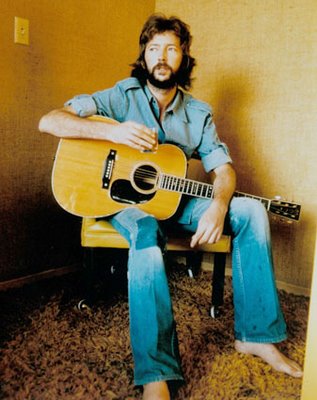December 2008 Recovery Hero Award Recipient

Eric Clapton.

Known as “Slowhand” Eric Clapton is the only member of The Rock And Roll Hall Of Fame to be inducted 3 times. Once with the band Cream, once with The Yardbirds and then also as a solo artist. He is also a multi grammy award winner for his music in film and TV. When one speaks of legendary guitar players Clapton’s name will always rise to the top. Along with a great talent there has been many tragedies in his life such as the death of his son at age 4 which brought forth the song “Teardrops From Heaven” from the pain and grief of a loving father. Clapton had to ID the body when he was early in recovery. Another tragedy struck when Stevie Ray Vaughan died in a helicoptor crash during a tour with Clapton. Both their helicoptors left in the fog at the same time. Vaughans turned left and crashed into a ski jump.
Clapton first got drunk at 16 and woke alone in the woods, with fouled trousers, vomit on his shirt and no money. As a good drunk Clapton states that he could not wait to do it all again. Clapton eventually became addicted to herion and suffered from D.T.’s, bleeding ulcers and grand mal seizures. He kicked the habit with a little help. It took him 2 tries to get clean and sober but he finally got it after about 6 years of trying. Clapton hits his in bottom in 1981, about 15 years after seeing his first piece of “Clapton Is God” written as graffitti a building in London
As a result of his experience and personal desire to help others, He founded Crossroads, the now famous recovery center that he built in Antigua. Clapton is also responsible for the annual Crossroads Music Festival to help raise money for those with substance abuse problems. He is dedicated to helping others through his time, money and talent.
Clapton singing “Cocaine” at the Crossroads Music Festival
Here is a portion from Clapton’s autobiography “Clapton” on his recovery.
“I stumbled through my month in treatment much as I had done the first time, just ticking off the days, hoping that something would change in me without me having to do much about it. Then one day, as my visit was drawing to an end, a panic hit me, and I realized that in fact nothing had changed in me, and that I was going back out into the world again completely unprotected. The noise in my head was deafening, and drinking was in my thoughts all the time. It shocked me to realize that here I was in a treatment center, a supposedly safe environment, and I was in serious danger. I was absolutely terrified, in complete despair.
At that moment, almost of their own accord, my legs gave way and I fell to my knees. In the privacy of my room I begged for help. I had no notion who I thought I was talking to, I just knew that I had come to the end of my tether, I had nothing left to fight with. Then I remembered what I had heard about surrender, something I thought I could never do, my pride just wouldn’t allow it, but I knew that on my own I wasn’t going to make it, so I asked for help, and, getting down on my knees, I surrendered.
Within a few days I realized that something had happened for me. An atheist would probably say it was just a change of attitude, and to a certain extent that’s true, but there was much more to it than that. I had found a place to turn to, a place I’d always known was there but never really wanted, or needed, to believe in. From that day until this, I have never failed to pray in the morning, on my knees, asking for help, and at night, to express gratitude for my life and, most of all, for my sobriety. I choose to kneel because I feel I need to humble myself when I pray, and with my ego, this is the most I can do.” (pg. 235-36)

